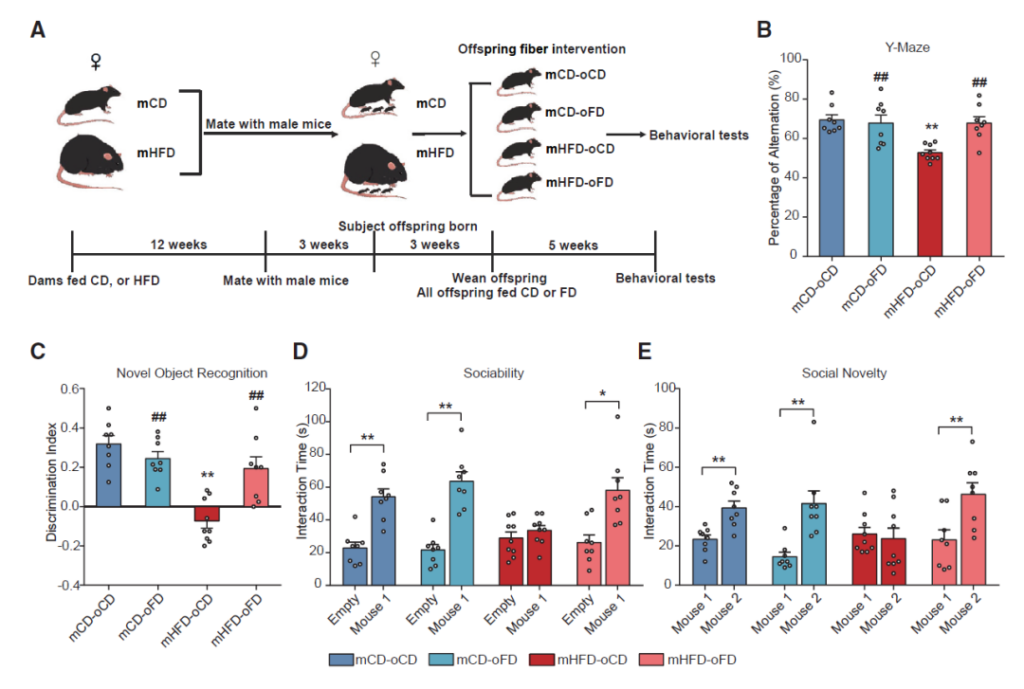The effect of high-fiber diet on obese mothers and their offspring
- Why Botulinum Toxin Reigns as One of the Deadliest Poisons?
- FDA Approves Pfizer’s One-Time Gene Therapy for Hemophilia B: $3.5 Million per Dose
- Aspirin: Study Finds Greater Benefits for These Colorectal Cancer Patients
- Cancer Can Occur Without Genetic Mutations?
- Statins Lower Blood Lipids: How Long is a Course?
- Warning: Smartwatch Blood Sugar Measurement Deemed Dangerous
The effect of high-fiber diet on obese mothers and their offspring
The effect of high-fiber diet on obese mothers and their offspring. Cell Metabolism: High-fiber diet can prevent maternal obesity from harming offspring’s cognition and behavior.
Due to high-calorie, low-fiber diets, high-sugar foods, and sedentary lifestyles, the global obesity rate of women of childbearing age is rising. According to statistics, in 2016, 40% of adult women in the world were overweight and 15% were obese. Status, and by 2025, the proportion of obese women in the world will exceed 21%.
Evidence from animal and human studies shows that maternal obesity can cause offspring to face higher risks of diabetes, hypertension, and behavioral changes. Recent national surveys conducted in the United Kingdom and the United States have shown that children of mothers who are obese before pregnancy are at higher risk of low cognitive levels and autism.
These studies have shown that maternal obesity before and during pregnancy can have a profound impact on the health of offspring. Then, what impact will maternal obesity during pregnancy have on offspring? How to adjust nutrition to change these effects?
On March 1, 2021, Professor Liu Xuebo and Professor Liu Zhigang of the School of Food Science and Technology of Northwest Agriculture and Forestry University, China, and Hou Min from Shanghai Jiaotong University are the co-corresponding authors. -induced cognitive and social dysfunction in the offspring via gut-brain axis” research paper [1].
This study shows that maternal obesity during pregnancy can lead to cognitive and social behavior deficits in offspring, and for the first time reveals that the “intestinal microecology-metabolite-brain” axis can interfere with the cognition and cognition and social behavior of offspring caused by high dietary fiber diet. New mechanisms in the role of social deficits.
More importantly, the study confirmed that supplementing mothers or offspring with dietary fiber can improve these defects caused by maternal obesity and provide new ideas for precise nutritional intervention strategies for high-fiber diets in early life neurodevelopment.
First, the research team investigated 778 children aged 7-14 in China and found that maternal obesity is closely related to the low-level cognition and social skills of offspring.
Next, the research team used the obese mouse model to conduct further studies. The experimental results showed that the obesity of the mouse mothers can disrupt the stable state of the intestinal flora of themselves and their offspring, and reduce the learning, memory and social abilities of the offspring.
Intervening obese mouse mothers and their offspring with a high dietary fiber diet can significantly improve the structure of the offspring’s intestinal flora and intestinal metabolites, reduce synaptic structure damage and microglia maturation defects, and improve their learning and social skills .
Then, the research team adopted methods such as mother flora transplantation, offspring co-cage test, microbial metabolite short-chain fatty acid intervention test, etc., to further confirm that the nutritional intervention effect of high dietary fiber diet on the development of the nervous system depends on the intestinal flora. And regulation of its metabolic processes.

Both population data and animal test results indicate that obesity before and during pregnancy is closely related to the decline in cognitive function and social skills of offspring, and this intergenerational connection is due to the intestinal microbes and their metabolites. Which played an important role.

New Mechanism of Diet Intervening Neurodevelopment in Early Life
In general, this study shows that maternal obesity during pregnancy can lead to cognitive and social behavior deficits in offspring, and for the first time revealed that the “intestinal microecology-metabolite-brain” axis is caused by the intervention of high dietary fiber diet in maternal obesity New mechanisms in the role of cognitive and social deficits in offspring.
More importantly, the study confirmed that supplementing mothers or offspring with dietary fiber can improve these defects caused by maternal obesity and provide new ideas for precise nutritional intervention strategies for high-fiber diets in early life neurodevelopment.
Doctoral student Liu Xiaoning of the School of Food Science and Technology of Northwest A&F University and Master student Li Xiang are the co-first authors of the paper. Professor Liu Xuebo and Professor Liu Zhigang of the School of Food Science and Technology of Northwest A&F University and Professor Hou Min from Shanghai Jiaotong University are the co-corresponding authors.
Northwest Sci-Tech University of Agriculture and Forestry is the first unit of this research. Shanghai Jiaotong University, Shenzhen Huada Agricultural Application Research Institute, Cornell University, University of Southern California, University of Arizona and other units participated in the research.
In fact, not only the mother’s diet can affect the offspring, but also the father. In May 2020, researchers from the Japanese Institute of Physics and Chemistry published a paper [2] in Molecular Cell magazine, indicating that the father’s low-protein or high-fat diet before giving birth will Lead to epigenetic changes in sperm, leading to metabolic disorders in offspring.
(source:internet, reference only)
Disclaimer of medicaltrend.org



